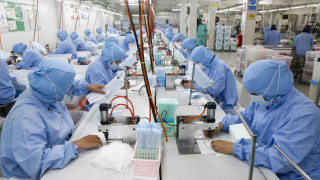The novel coronavirus is spread by droplets produced when those infected cough, sneeze or speak. If an infected person wears a face mask, it reduces the spread of infectious particles and decreases the risk of infecting another person. However, there is not (yet) a straightforward answer as to whether or not a healthy person should wear a face mask.
One of the recommendations in China and South Korea to contain the spread of the virus was to wear face masks.
The World Health Organisation (WHO), the American Centre for Disease Control (CDC) and health professionals kept saying that face masks could not protect us from infection and a healthy person should not wear a face mask. The WHO declared: “If you are not ill or looking after someone who is ill then you are wasting a mask. There is a world-wide shortage of masks, so use them wisely.”
According to the WHO’s information, wearing a face mask was not recommended for healthy people since there was no evidence that a medical face mask provided protection against being infecting by the novel coronavirus. The WHO recommended that only people with COVID-19 symptoms should wear face masks whilst a healthy person only needed to wear a mask if he was taking care of a person with a suspected 2019-nCoV infection.
At the same time, the improper use of face masks increases the risk of infection. For instance, whilst using the face mask a person often touches his face with his hands in order to adjust it. The WHO clarifies the rules to properly use a face mask:
· The mask should not be re-used.
· Before putting on the mask clean your hands with soap and water or alcohol-based hand rub.
· The mask should be covering the nose and the mouth and be tightly fitted to the face.
· Do not touch the front of the mask or wash your hands if you touch it.
· To take off the mask do not touch the front and discard the mask immediately in a closed bin and wash your hands or clean them with special hand rub.
The pandemic has caused a worldwide shortage of medical masks. Given this fact, it is rational to argue that face masks should be used by infected persons or those who have contact with them. However, it has already been confirmed that the disease might show no symptoms and the transmission of the virus can happen before the symptoms start. In this case, the mass using of face masks is important. At the beginning of April 2020, the WHO and the American CDC changed their positions in regard to the wearing of face masks.
The CDC recommends the mass use of face masks in public gathering places (for instance, grocery stores and pharmacies). In addition, the CDC also recommends using cloth face coverings. As clarified by the CDC, medical masks (surgical or N95 respiratory) are an extremely valuable resource and they should be preserved for healthcare personnel.
On 6 April, the Director-General of the WHO, Tedros Adhanom Ghebreyesus, stated that the adoption of face masks makes sense in countries where other preventive measures against the coronavirus are difficult to adopt. Mr Ghebreyesus also added that masks must be also a part of a broaderpackage of intervention rather than providing a panacea. The WHO Director-General also underlined that that widespread mask use could cause shortages for those who need them the most.
Of note is that the Czech Republic, Slovakia, Austria and Bulgaria are widely using face masks to contain the spread of the coronavirus.
Recommendations on Wearing Face Masks in Georgia and Supply Shortage
Georgia largely follows the WHO’s recommendations. Wearing face masks is recommended only for infected people and those who have contact with them. However, in the nearest future, this approach will be changed in Georgia, too, since wearing face masks as one of the measures to contain the spread of the disease is already under discussion in the world.
At the end of February, there was already a shortage of face masks in Georgia and this problem remains unsolved. On 28 February 2020, the Minister of Healthcare, Ekaterine Tikaradze, stated: “There is a worldwide shortage of face masks and it was natural we could not avoid it. However, we are working with the producers to bring additional face masks for a respective price.” However, in light of the scale of the virus spread, the demand for face masks increased further and caused an even more acute shortage. On 19 March 2020, the Ministry of Economy and Sustainable Development of Georgia organised the launch of the production of multiple-use face masks. At the initial stage, Georgian-made face masks are intended for a particular target groups (people over the age of 70 years with chronic diseases, the patrol police, quarantine personnel, custom officers, employees of municipal services, etc.). On 2 April, the Minister of Economy and Sustainable Development, Natia Turnava, stated that Georgian-made face masks would appear on pharmacy shelves supposedly from the next week. However, currently face masks are not available throughout the country’s pharmacy network.
On 7 April, FactCheck contacted the PSP, Impex and Pharmadepot pharmacy chains which told us they did not have face masks. Impex stated that they expect Georgian-made face masks in nearly one week whilst PSP and Pharmadepot have no information when they will resume selling face masks.
Update:
On April 8, Natia Turnava, the minister of Economy stated the following: “Beginning today, we are sending 400 000 reusable face masks produced in Georgia to the pharmacies. It will take about 2 days these masks to be delivered to the major pharmaceutical companies.” According to her, the pharmaceutical companies (“Aversi”, “PSP”, “Pharmadepot”, “GPC”) will start selling the masks on Saturday, at the latest. The fixed price of these masks will be 0.5 GEL. The pharmacies will decide by themselves what quantity of masks can be purchased by a single person.







